Contributed by: Yu Min Office of International Exchange and Cooperation | Edited by: Liu Ye | Preliminary Review: Wei Xinqiang | Final Review: Liang Lili | Date: May 25, 2024
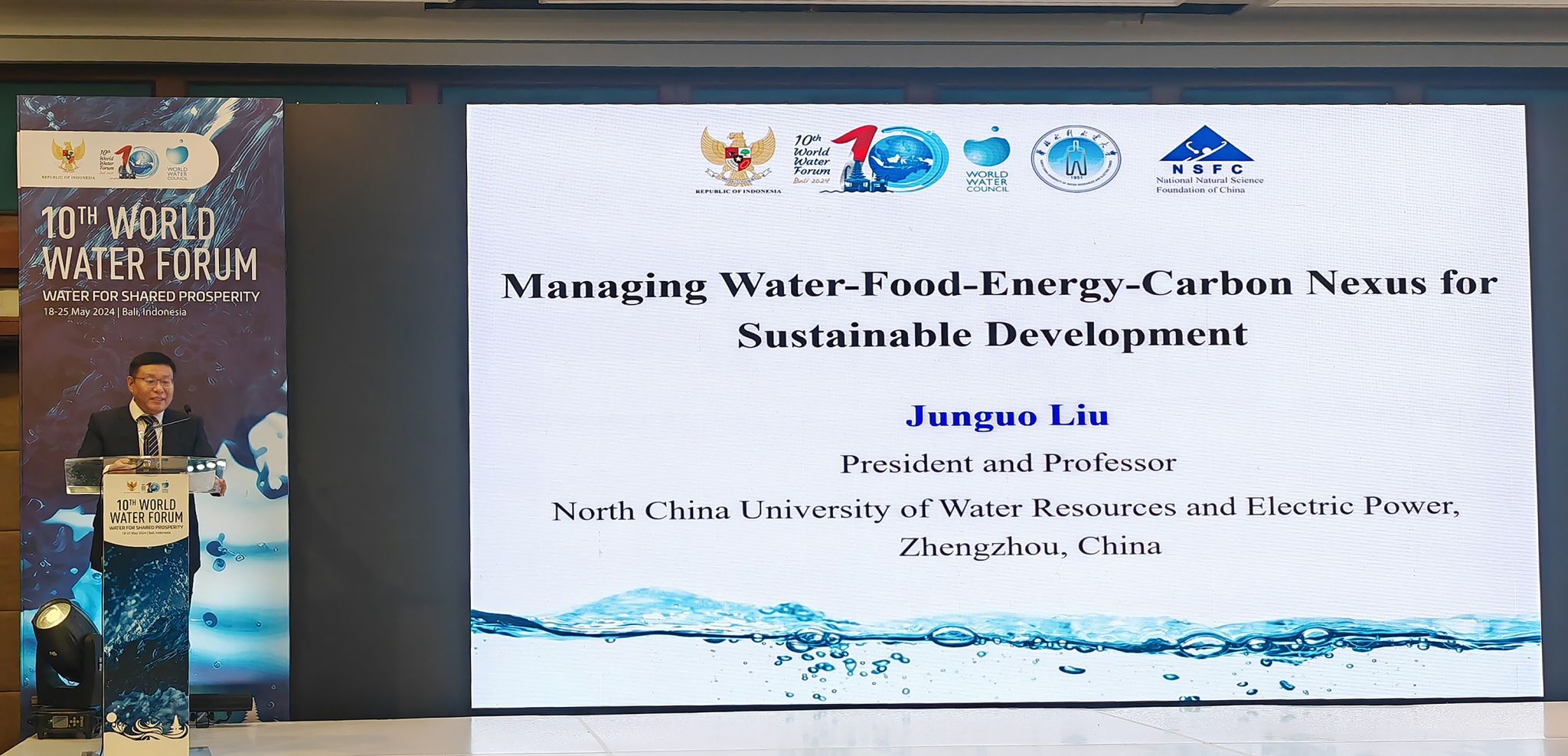
President Liu Junguo presents at the "Water-Food-Energy-Carbon Nexus for Sustainable Development" side event.

Group photo from the "Water-Food-Energy-Carbon Nexus for Sustainable Development" side event.

UNESCO-IHP Chair, Prof. Yu Zhongbo, addresses the "Water-Food-Energy-Carbon Nexus" side event.
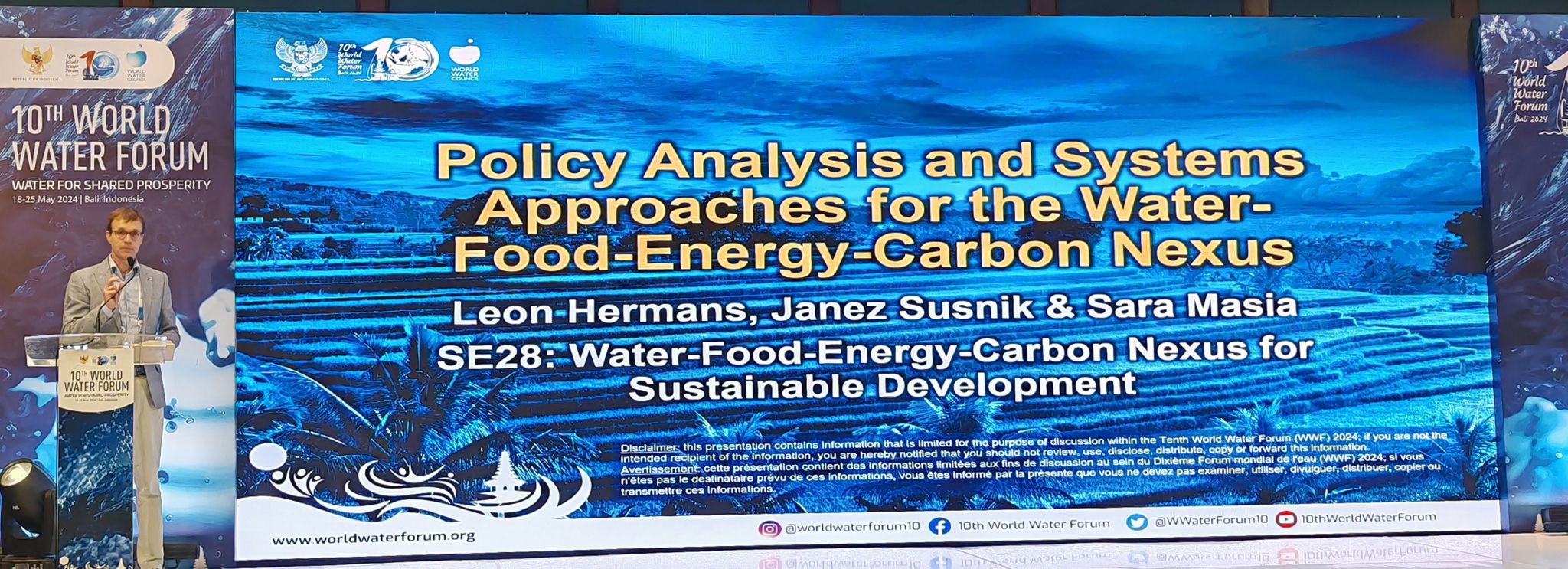
Prof. Leon Hermans presents at the "Water-Food-Energy-Carbon Nexus" side event.
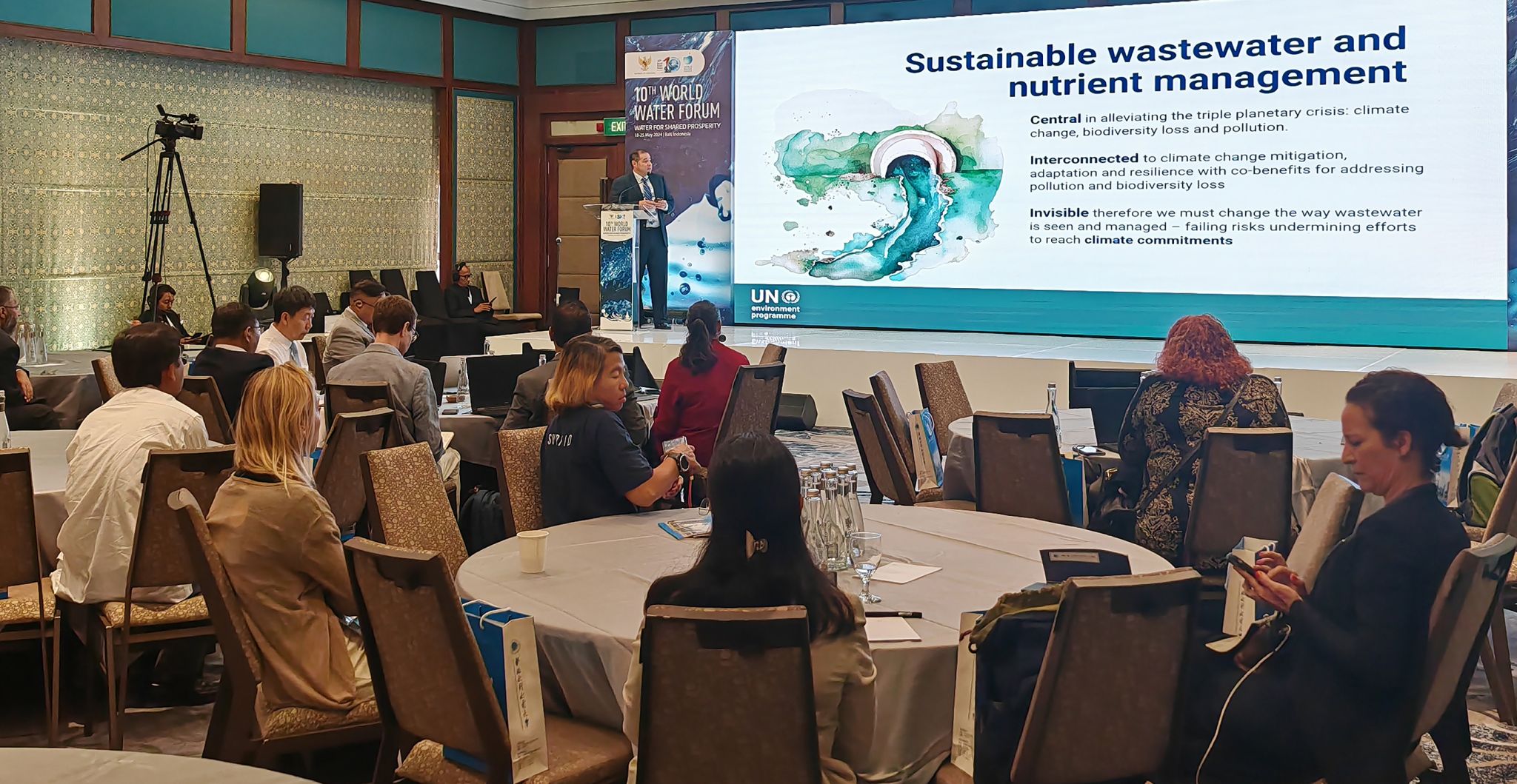
Prof. Alex Pires presents at the "Water-Food-Energy-Carbon Nexus" side event.
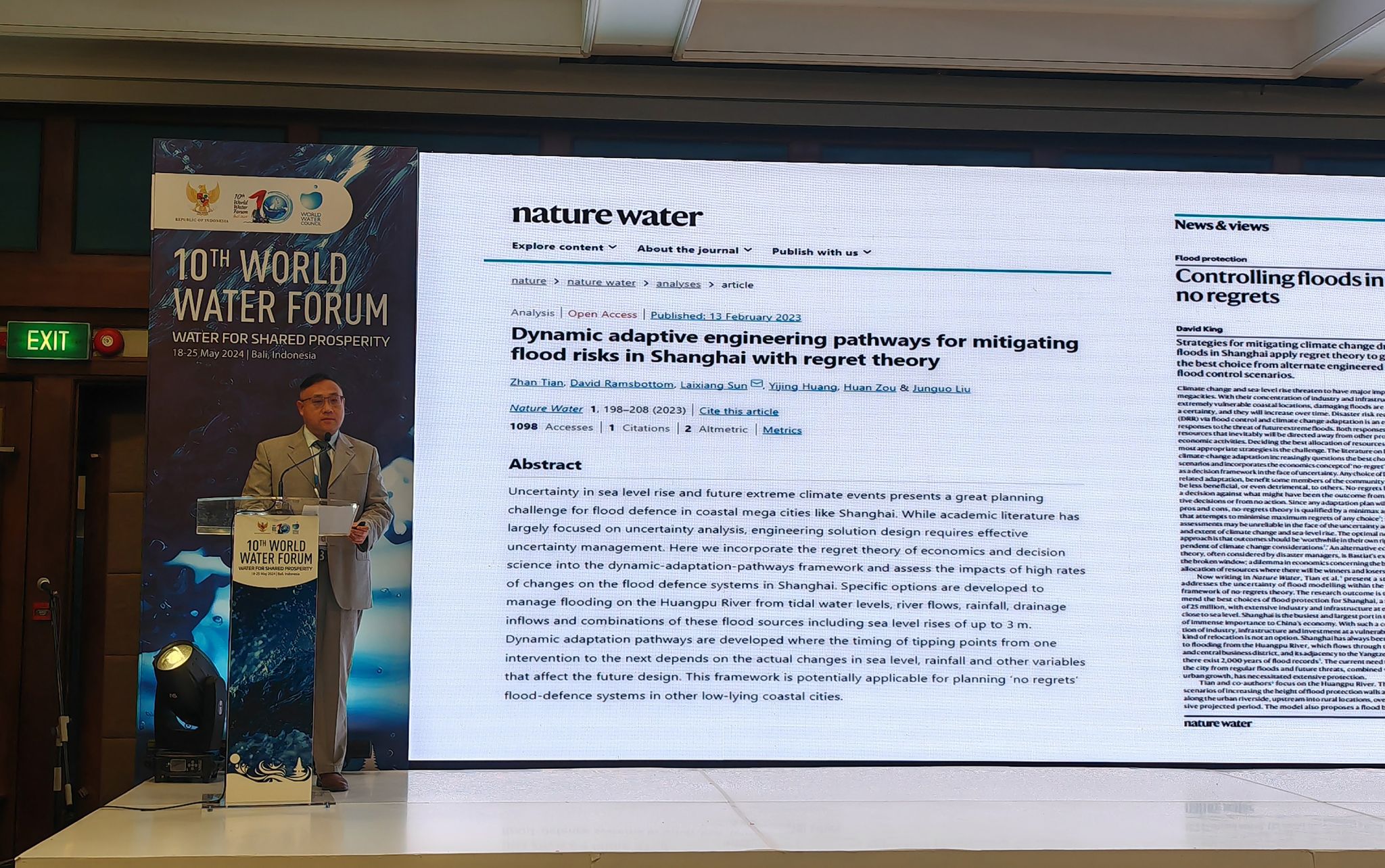
Prof. Tian Zhan presents at the "Water-Food-Energy-Carbon Nexus" side event.
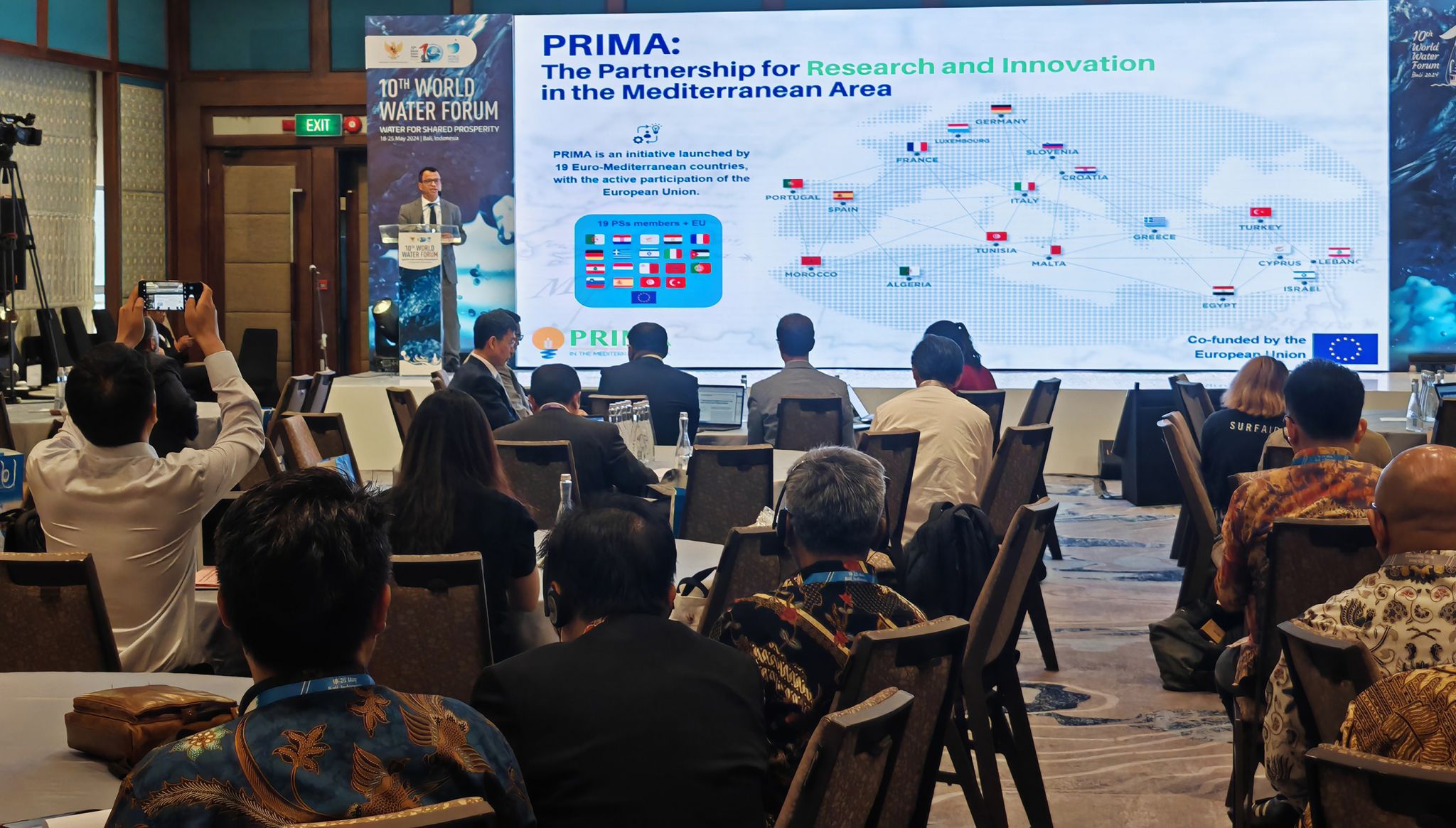
Prof. Ali Rhouma presents at the "Water-Food-Energy-Carbon Nexus" side event.

Prof. Xiao Xin presents at the "Water-Food-Energy-Carbon Nexus" side event.
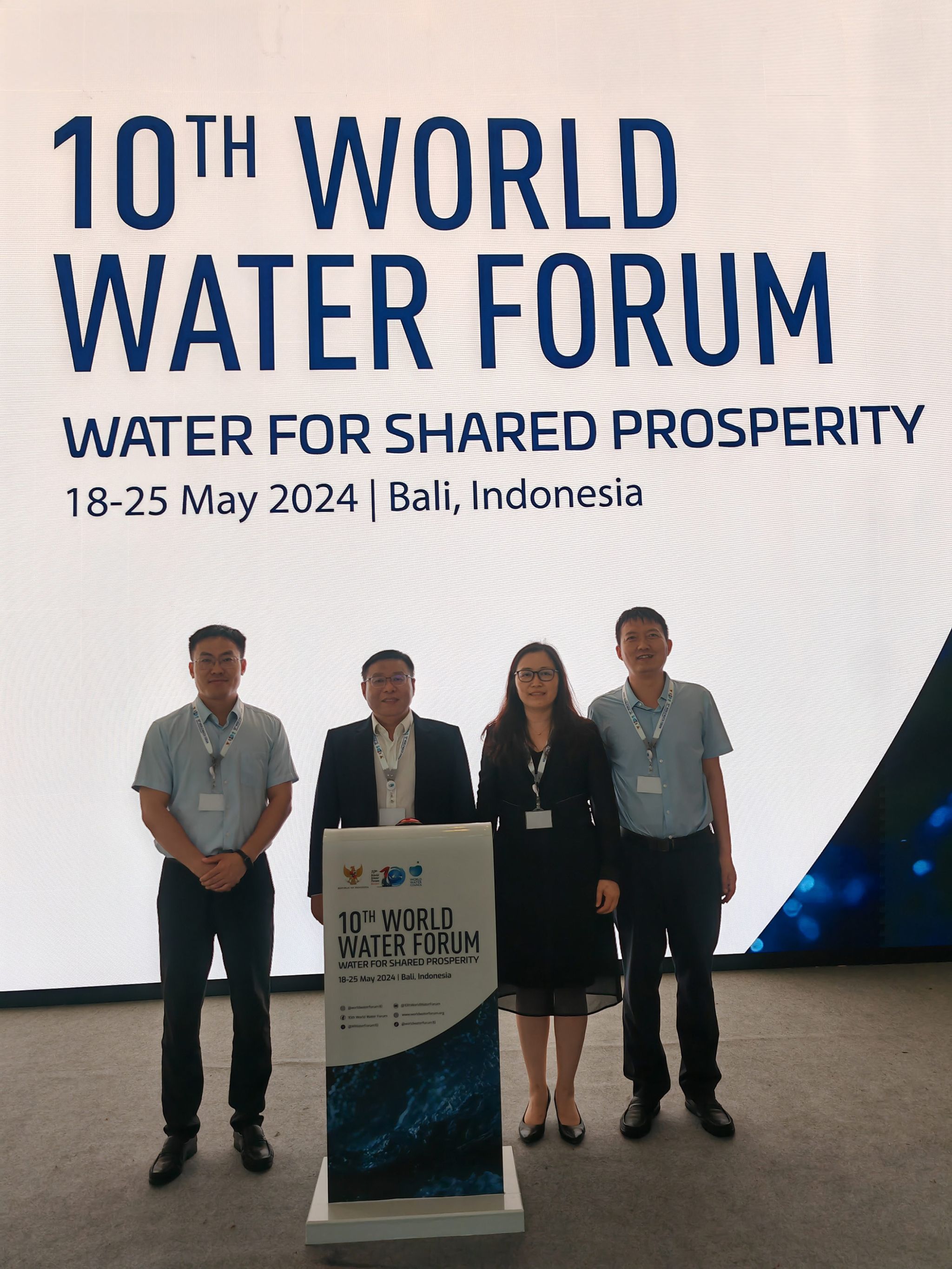
President Liu Junguo leads a delegation to the 10th World Water Forum.

President Liu Junguo with Prof. Eddy J. Moors (Rector of IHE Delft Institute for Water Education) and Dr. Arie Setiadi Moerwanto (Senior Water Resources Engineer at the Directorate General of Water Resources, Indonesian Ministry of Public Works and Housing).
The 10th World Water Forum, co-hosted by the World Water Council and the Indonesian government, was held in Bali, Indonesia, from May 20th to 25th under the theme "Water for Shared Prosperity". Indonesian President Joko Widodo, World Water Council President Loic Fauchon, and Chinese Minister of Water Resources Li Guoying attended the conference and delivered speeches. Professor Liu Junguo, President of North China University of Water Resources and Electric Power (NCWU), was invited to lead a delegation to participate in a series of important events, and successfully hosted a side event titled "Water-Food-Energy-Carbon Nexus for Sustainable Development".
At the opening ceremony on May 20th, President Joko Widodo emphasized the need for global solidarity and cooperation in overcoming water challenges and achieving shared prosperity. World Water Council President Loïc Fauchon highlighted the escalating global water demand driven by climate change, population growth, urbanization, and rising living standards. He expressed his hope that the forum would serve as a pivotal moment for concrete action, galvanizing global efforts towards water security and prosperity. Chinese Minister of Water Resources Li Guoying acknowledged water disasters, water resources, water ecosystems, and water environments as four major water challenges shared by China and many other nations. He reaffirmed China's commitment to collaborating with the international community in writing a new chapter in global water governance, contributing to the building of a community with a shared future for mankind.
On May 21st, at the invitation of the Ministry of Water Resources, Professor Liu Junguo led a delegation to attend the 4th Meeting of the High Level Panel on Water (HLPW), a special session held during the World Water Forum. This session also marked the launch of the English publication of "The In-depth Learning and Implementation of Xi Jinping’s Important Discourse on Water Governance". Chinese Minister of Water Resources Li Guoying delivered a keynote address highlighting the book's importance, and jointly with Loic Fauchon, President of the World Water Council, and Zhang Zhisheng, the Chinese Consul-General in Denpasar, unveiled the inaugural release of the book. Professor Liu engaged in in-depth exchanges with experts in attendance. Later that day, President Liu Junguo and the delegation also attended the thematic session "River Life: Water and Ecosystem Connectivity and Ecological Flows" at the invitation of the organizers. This session featured the launch of the report "River Ethics and China's Practice", where Li Guoying and Lidia Arthur Brito, UNESCO Assistant Director-General for Natural Sciences, jointly unveiled the report.
On the morning of May 24th, NCWU hosted a successful side event titled "Water-Food-Energy-Carbon Nexus for Sustainable Development" at the 10th World Water Forum in Bali, Indonesia. Professor Liu Junguo chaired the event and delivered a keynote address titled "Managing Water-Food-Energy-Carbon Nexus for Sustainable Development". Professor Yu Zhongbo, Chair of the UNESCO Intergovernmental Hydrological Programme (UNESCO-IHP) and Chair of the UNESCO-IHP Regional Steering Committee for Asia and the Pacific, attended the meeting and delivered remarks. Participants who presented reports included Professor Leon Hermans, Head of the Land and Water Management Department, IHE Delft Institute for Water Education, from the Netherlands; Alex Pires, Head of Source to Sea Pollution Unit at the Marine and Freshwater Branch, United Nations Environment Programme (UNEP), from Sweden; Professor Tian Zhan, Research Professor at Southern University of Science and Technology (SUSTech), from China; Professor Ali Rhouma, Project Officer at PRIMA Foundation, from Spain; and Dr. Xiao Xin, Distinguished Researcher at the Chinese Academy of Sciences (CAS), from China. The event drew nearly 100 participants, including experts and scholars from Sweden, the United States, Indonesia, and other countries.
President Liu extended a warm welcome and expressed his sincere gratitude to the participating experts. He commenced the session by providing an overview of NCWU and the context for the side event. "Water, food, and energy are indispensable resources for human survival," President Liu remarked. "Ensuring water, food, and energy security is paramount to achieving the United Nations Sustainable Development Goals 2030 and lies at the heart of the UN Environment Programme's response to global challenges posed by climate change." He further emphasized that "research on the water-food-energy-carbon nexus provides a novel and systematic perspective for global resource management. By analyzing the intricate interplay between water, energy, food, and carbon emissions, we can develop scientific and technological solutions to address climate change and global environmental challenges." President Liu highlighted that "this interdisciplinary approach not only fosters international collaboration and technological innovation but also enhances global food and energy security. It provides theoretical and practical support for formulating effective international policies, significantly improving the strategic planning and implementation efficiency of global sustainable development." Professor Yu Zhongbo commended NCWU for organizing the event, stating that "this conference holds significant theoretical value and practical implications for optimizing the water-food-energy-carbon nexus, guided by the 'dual carbon' goals. It explores spatial optimization strategies to address spatial conflicts, resource mismatches, and improve resource allocation efficiency." Following Professor Yu's remarks, the participating experts delivered their presentations, delving into their respective areas of expertise within the overarching theme of the event. At the conclusion, President Liu summarized the key takeaways from the discussions and extended a heartfelt invitation for continued collaboration. "NCWU remains committed to working alongside all of you to advance global water security, and promote water prosperity, contributing to building a shared future for humanity," he affirmed. The side event concluded successfully, garnering high praise from attendees for its insightful discussions and collaborative spirit.
In addition to the forum itself, President Liu and the delegation took part in the China Water Exhibition organized by the China Water & Power Press. They held fruitful discussions with influential figures in the water sector, including: Professor Eddy J. Moors, Rector of IHE Delft Institute for Water Education; Dr. Arie Setiadi Moerwanto, Senior Water Resources Engineer at the Directorate General of Water Resources, Indonesian Ministry of Public Works and Housing; and Professor Widodo, Rector of Brawijaya University, Indonesia, among other experts.
The participation of NCWU in the 10th World Water Forum and the successful organization of the side event on "Managing Water-Food-Energy-Carbon Nexus for Sustainable Development" exemplify our commitment to implementing the principles enshrined within "The In-depth Learning and Implementation of Xi Jinping's Important Discourse on Water Governance". They also reflect our dedication to addressing critical national and global concerns. This marked the first instance of NCWU organizing an international conference overseas. The resounding success of the event significantly elevates NCWU's international profile and highlights the global reputation of its water resources disciplines. It represents a proactive step towards strengthening our international voice in water research and marks another milestone in our internationalization journey.
Since its inception in 1997, the World Water Forum has been held triennially and has become the largest and most influential international event in the water sector. Jointly organized by the World Water Council and the host country's government, this year's forum marked the first time the event was held in Southeast Asia. The forum featured numerous sessions covering critical themes such as water security and prosperity, water for humans and nature, disaster risk reduction and water management, water cooperation and diplomacy, sustainable water financing, and knowledge and innovation. Over 50 side events were approved for this year's forum, with only four universities granted the opportunity to host them, including North China University of Water Resources and Electric Power, Delft University of Technology, Ghent University, and the Daugherty Water for Food Global Institute at the University of Nebraska.